NEWS ROUNDUP
Rebuilding power ● We’re getting ripped off ● SCOTUS v. democracy
Monday, July 9, 2018
UNION STRONG
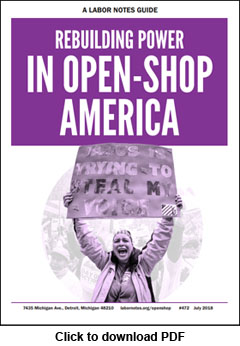 ► From Labor Notes — Rebuilding power in open-shop America: A Labor Notes guide — The Supreme Court has imposed the open shop on the public sector nationwide with its decision in Janus v. AFSCME District 31. Instead of the usual mix of articles, this month we’re sharing a special expanded issue of Labor Notes devoted to one topic: our survival guide for rebuilding power in open-shop America.
► From Labor Notes — Rebuilding power in open-shop America: A Labor Notes guide — The Supreme Court has imposed the open shop on the public sector nationwide with its decision in Janus v. AFSCME District 31. Instead of the usual mix of articles, this month we’re sharing a special expanded issue of Labor Notes devoted to one topic: our survival guide for rebuilding power in open-shop America.
► In the (Everett) Herald — Court decision makes clear the need for unions (by Dan Jacoby) — Because workplace problems are not going away, there will always be a need for a movement that responds to felt issues using whatever tools are available. Now is the time for strategizing how best to make labor’s voices heard.
► From The American Prospect — After Janus: Labor’s recommitment campaigns energize the rank and file — Unions have been preparing for Janus for several years and the response from organized labor might represent a paradigm shift that could transform public-sector organizing in the post-Janus world. California has already erupted in a virtual fever of union organizing and membership-building unseen since the public-sector labor movement’s formative heyday in the 1960s and 1970s.
THIS WASHINGTON
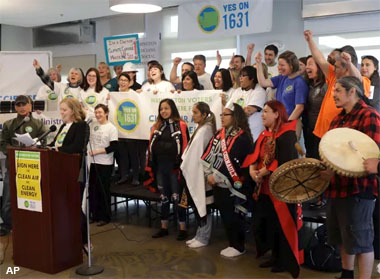 ► From Earther — Why Washington’s latest carbon fee might just pass — This new initiative is different than typical carbon tax proposals where politicians and representatives decide where the money goes. All the money collected from the fee would go back into communities across the state to address problems—and solutions!—around climate change. To be exact, 70 percent of the funds accumulated from this carbon fee must go toward clean air and clean energy investments. A quarter of the money should be invested in clean water and healthy forests, which would protect people and property from wildfires (especially Native American tribes that live in these regions). The remaining five percent would go toward preparing vulnerable communities from climate change. Think of neighborhoods in South Seattle, or white rural towns in the middle of the state.
► From Earther — Why Washington’s latest carbon fee might just pass — This new initiative is different than typical carbon tax proposals where politicians and representatives decide where the money goes. All the money collected from the fee would go back into communities across the state to address problems—and solutions!—around climate change. To be exact, 70 percent of the funds accumulated from this carbon fee must go toward clean air and clean energy investments. A quarter of the money should be invested in clean water and healthy forests, which would protect people and property from wildfires (especially Native American tribes that live in these regions). The remaining five percent would go toward preparing vulnerable communities from climate change. Think of neighborhoods in South Seattle, or white rural towns in the middle of the state.
► In today’s News Tribune — Why a Tacoma lawmaker — and his accuser — are calling for a better way to investigate misconduct at the Legislature — Rep. David Sawyer (D-Tacoma) and a House staff member who reported his alleged behavior have very different critiques, but share a common suggestion: Remove workplace issues from the purview of top Democrats and political appointees in the Chief Clerk’s Office to avoid partisan intrusion.
► In the Spokesman-Review — Dozens of initiatives won’t make the ballot (by Jim Camden) — Despite all this fishing for an initiative that could generate public support and an influx of donations, Tim Eyman & Co. had to abandon the ballot initiative chase and turn their attention to the Legislature, which gives them until December to collect signatures, and possibly donations.
► In the Seattle Times — Tim Eyman’s been on the ropes many times before. But not as bad as this. (by Danny Westneat) — Between a court holding Eyman in contempt and his struggles to raise money, even the longtime initiative promoter is suggesting his latest car- tabs measure might be his last stand.
LOCAL
► In today’s Seattle Times — Is Station 31 making Seattle firefighters sick? Study hopes to find answers about ‘Cancer House’ — For years, firefighters at the Seattle Fire Department’s Station 31 have believed they were contracting cancer at an unusually high rate. A study by the Fred Hutchinson center will determine whether they are being diagnosed at higher rates than other Seattle firefighters.
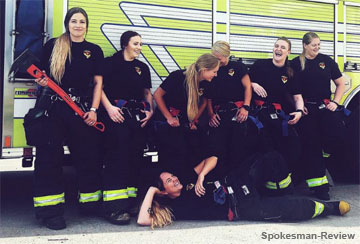 ► In today’s Spokesman-Review — All-female firefighter crew is a milestone for Fire District 10 — Spokane County Fire District 10 has been trying to organize an all-female crew for months. Last week, schedulers pulled it off. The district, which surrounds Airway Heights on the West Plains, hit a milestone on July 3, staffing a shift with only female firefighters – the first time it has been done in Spokane County, they said. Rachel Rademacher, McKenna Jimno, Kelsey Wardsworth, Amanda Pastian, Shyann Morton, Tiffany Pope and Brittany Wuesthoff made up the crew.
► In today’s Spokesman-Review — All-female firefighter crew is a milestone for Fire District 10 — Spokane County Fire District 10 has been trying to organize an all-female crew for months. Last week, schedulers pulled it off. The district, which surrounds Airway Heights on the West Plains, hit a milestone on July 3, staffing a shift with only female firefighters – the first time it has been done in Spokane County, they said. Rachel Rademacher, McKenna Jimno, Kelsey Wardsworth, Amanda Pastian, Shyann Morton, Tiffany Pope and Brittany Wuesthoff made up the crew.
► From The Guardian — Exploited Amazon workers need a union. When will they get one? (by
EDITOR’S NOTE — Work at an Amazon warehouse or anywhere else where you want better wages and working conditions? Contact a union organizer today and find out how you and your co-workers can join together and negotiate a fair return for your work!
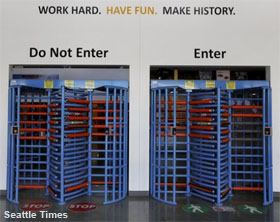 ► In today’s Seattle Times — Amazon warehouse workers need a union — a heavy lift in America (by Jon Talton) — My reaction to the Amazon stories: These people need a union. Layoffs at Whole Foods after the Amazon acquisition have raised the discussion. But in America, conservative Republicans hold power in D.C. and are likely to cement a right-wing Supreme Court for decades. This is throwing unions back to the ‘90s — the 1890s. So until the pendulum swings back to some balance — a long arc of history — warehouse workers will be at a huge disadvantage. And the resulting political and social instability is only beginning.
► In today’s Seattle Times — Amazon warehouse workers need a union — a heavy lift in America (by Jon Talton) — My reaction to the Amazon stories: These people need a union. Layoffs at Whole Foods after the Amazon acquisition have raised the discussion. But in America, conservative Republicans hold power in D.C. and are likely to cement a right-wing Supreme Court for decades. This is throwing unions back to the ‘90s — the 1890s. So until the pendulum swings back to some balance — a long arc of history — warehouse workers will be at a huge disadvantage. And the resulting political and social instability is only beginning.
THAT WASHINGTON
 ► In today’s Washington Post — Trump’s fight with federal employee unions gets real on Monday — Federal agencies on Monday begin implementing executive orders from President Trump on how to confront employee unions, following strict guidelines likely to escalate tensions that have been building since the president took office. The administration wants agencies to reopen collective bargaining agreements to reduce the on-duty time union representatives spend representing employees. Managers are directed to “monitor and carefully report” on the time and make the information publicly available. And agencies are directed to move swiftly to fire poor performers, renegotiating any contracts that allow for progressive discipline.
► In today’s Washington Post — Trump’s fight with federal employee unions gets real on Monday — Federal agencies on Monday begin implementing executive orders from President Trump on how to confront employee unions, following strict guidelines likely to escalate tensions that have been building since the president took office. The administration wants agencies to reopen collective bargaining agreements to reduce the on-duty time union representatives spend representing employees. Managers are directed to “monitor and carefully report” on the time and make the information publicly available. And agencies are directed to move swiftly to fire poor performers, renegotiating any contracts that allow for progressive discipline.
 ► From Business Insider — As Trump targets trade, a Chinese factory says it’s been hired to make flags for Trump’s 2020 campaign — As the U.S.’s trade conflict with China heats up and President Donald Trump’s reelection campaign gets underway, a Chinese manufacturer says his factory has been hired to create flags for Trump’s 2020 bid. The factory, which used to make red scarves for the communist Young Pioneers before China opened up its trade, now makes about 100,000 international flags a day.
► From Business Insider — As Trump targets trade, a Chinese factory says it’s been hired to make flags for Trump’s 2020 campaign — As the U.S.’s trade conflict with China heats up and President Donald Trump’s reelection campaign gets underway, a Chinese manufacturer says his factory has been hired to create flags for Trump’s 2020 bid. The factory, which used to make red scarves for the communist Young Pioneers before China opened up its trade, now makes about 100,000 international flags a day.
► In today’s NY Times — Tax policy writers leave government for lobbying jobs — As businesses scramble to navigate the new tax law, they are recruiting the people who wrote it to help look for loopholes.
NATIONAL
► From New York magazine — New study confirms that American workers are getting ripped off — A new report from the Organization for Economic Cooperation and Development (OECD) offers a straightforward — and political — explanation for stagnant wages amid low unemployment: American policymakers have chosen to design an economic system that leaves workers desperate and disempowered, for the sake of directing a higher share of economic growth to bosses and shareholders.
 ► In the Washington Post — Is it great to be a worker in the U.S.? Not compared with the rest of the developed world. — A new 296-page report from the OECD shows the United States’ unemployed and at-risk workers are getting very little support from the government, and their employed peers are set back by a particularly weak collective-bargaining system. Those factors have contributed to the United States having a higher level of income inequality and a larger share of low-income residents than almost any other advanced nation.
► In the Washington Post — Is it great to be a worker in the U.S.? Not compared with the rest of the developed world. — A new 296-page report from the OECD shows the United States’ unemployed and at-risk workers are getting very little support from the government, and their employed peers are set back by a particularly weak collective-bargaining system. Those factors have contributed to the United States having a higher level of income inequality and a larger share of low-income residents than almost any other advanced nation.
► In the NY Times — Fresh proof that strong unions help reduce income inequality — New evidence shows that unions played a major role in reducing income inequality in the United States in the decades when organized labor was strong. But it also demonstrates that the decline in union power since the 1960s — which may be exacerbated as a result of a recent Supreme Court decision — has contributed to the widening gap between rich and poor.
► From The Guardian — Two amputations a week: the cost of working in a U.S. meat plant — Amputations, fractured fingers, second-degree burns and head trauma are just some of the serious injuries suffered by U.S. meat plant workers every week, according to new data. U.S. meat workers are already three times more likely to suffer serious injury than the average American worker, and pork and beef workers nearly seven times more likely to suffer repetitive strain injuries. And some fear that plans to remove speed restrictions on pig processing lines – currently being debated by the government – will only make the work more difficult.
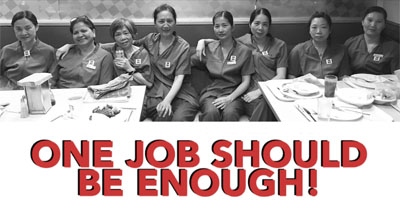 ► From the IUF — Marriott workers around the world demand global measures to combat sexual harassment — On June 27, IUF members at Marriott hotels around the world demonstrated in support of the call for concrete action by the world’s largest hotel group to protect workers from the endemic sexual harassment which afflicts hospitality workers. In Canada and the U.S., thousands of Marriott workers led by UNITE HERE joined together in a collective day of action to demand safer working conditions, protections against sexual harassment, and a voice on the job. UNITE HERE rallied members and workers from non-union hotels around the slogan ‘One job should be enough!’ for workers to live in the cities where they work, support a family, and retire with dignity.
► From the IUF — Marriott workers around the world demand global measures to combat sexual harassment — On June 27, IUF members at Marriott hotels around the world demonstrated in support of the call for concrete action by the world’s largest hotel group to protect workers from the endemic sexual harassment which afflicts hospitality workers. In Canada and the U.S., thousands of Marriott workers led by UNITE HERE joined together in a collective day of action to demand safer working conditions, protections against sexual harassment, and a voice on the job. UNITE HERE rallied members and workers from non-union hotels around the slogan ‘One job should be enough!’ for workers to live in the cities where they work, support a family, and retire with dignity.
PREVIOUSLY at The Stand — One Job Should Be Enough: Support Westin Hotel workers
► In today’s LA Times — Union workers picket in Vegas, worried about pay, security and robots taking their jobs — Along with concerns about wages, the union workers hope new contracts will address increased use of robots to do their work, and — in the shadow of last year’s mass shooting — security.
► In the NY Times — ‘It’s almost like a ghost town.’ Most nursing homes overstated staffing for years — Most nursing homes had fewer nurses and caretaking staff than they had reported to the government for years, according to new federal data, bolstering the long-held suspicions of many families that staffing levels were often inadequate.
TODAY’S MUST-READ
► From Vox — The Supreme Court vs. democracy (by Ezra Klein) — Tonight, at 9 pm Eastern, President Donald Trump will announce his pick to replace Justice Anthony Kennedy on the Supreme Court. With Kennedy’s replacement, four out of the Supreme Court’s nine justices — all of whom have lifetime tenure — will have been nominated by presidents who won the White House, at least initially, despite losing the popular vote.
 The Supreme Court’s conservative bloc doesn’t just reflect the outcomes of America’s undemocratic electoral rules; it is writing and, in some cases, rewriting them, to favor the Republican Party — making it easier to suppress votes, simpler for corporations and billionaires to buy elections, and legal for incumbents to gerrymander districts to protect and enhance their majorities. The Supreme Court has always been undemocratic. What it’s becoming is something more dangerous: anti-democratic. The Supreme Court is meant to be insulated from democracy. It’s not meant to be a partisan tool for undermining democracy. What’s emerging now is a dangerous loop, in which Republicans barely holding onto power manage to keep control of the Supreme Court by any means necessary, and in return, the Supreme Court’s Republican appointees issue rulings to help their party cling to political power.
The Supreme Court’s conservative bloc doesn’t just reflect the outcomes of America’s undemocratic electoral rules; it is writing and, in some cases, rewriting them, to favor the Republican Party — making it easier to suppress votes, simpler for corporations and billionaires to buy elections, and legal for incumbents to gerrymander districts to protect and enhance their majorities. The Supreme Court has always been undemocratic. What it’s becoming is something more dangerous: anti-democratic. The Supreme Court is meant to be insulated from democracy. It’s not meant to be a partisan tool for undermining democracy. What’s emerging now is a dangerous loop, in which Republicans barely holding onto power manage to keep control of the Supreme Court by any means necessary, and in return, the Supreme Court’s Republican appointees issue rulings to help their party cling to political power.
The Stand posts links to Washington state and national news of interest every weekday morning by 10 a.m.






